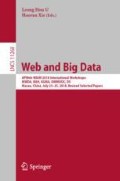Abstract
MOOCs have attracted a large number of learners with different education background all over the world. Despite its increasing popularity, MOOCs still suffer from the problem of high drop-out rate. One important reason may be due to the difficulty in understanding learning demand and user interests. To helper users find the most suitable courses, personalized course recommendation technology has become a hot research topic in e-learning and data mining community. One of the keys to the success of personalized course recommendation is a good user modeling method. Previous works in course recommendation often focus on developing user modeling methodology which learns latent user interests from historic learning data. Recently, interactive course recommendation has become more and more popular. In this paradigm, recommender systems can directly query user interests through survey tables or questionnaires and thus the learned interests may be more accurate. In this paper, we study the user interest acquisition problem based on the interactive course recommendation framework (ICRF). Under this framework, we systematically discuss different settings on querying user interests. To reduce performance-cost score, we propose the ICRF user interest acquisition algorithm that combines representative sampling and interest propagation algorithm to acquire user interests in a cost-effective way. With extensive experiments on real-world MOOC course enrollment datasets, we empirically demonstrate that our selective acquisition strategy is very effective and it can reduce the performance-cost score by 30.25% compared to the traditional aggressive acquisition strategies.
Access this chapter
Tax calculation will be finalised at checkout
Purchases are for personal use only
Notes
- 1.
- 2.
- 3.
The ratings in real-world MOOC platforms can have different numerical intervals. To simplify our work, we assume those ratings can be normalized in the interval between zero and one.
- 4.
In the rest of this paper, the ICRF user interest acquisition algorithm and the ICRF algorithm will be used interchangeably.
- 5.
The oracle refers to a virtual agent that is omniscient to know true user interests.
- 6.
The MOOC platform provides free online courses for both on-campus students and off-campus professional employees in China.
References
Koller, D.: MOOCs on the move: How coursera is disrupting the traditional classroom. Knowledge@Wharton Podcast (2012)
Parameswaran, A., Venetis, P., Garcia-Molina, H.: Recommendation systems with complex constraints: a course recommendation perspective. ACM Trans. Inf. Syst. 29(4), 20:1–20:33 (2011)
Schein, A.I., Popescul, A., Ungar, L.H., Pennock, D.M.: Methods and metrics for cold-start recommendations. In: Proceedings of the 25th Annual International ACM SIGIR Conference on Research and Development in Information Retrieval, pp. 253–260. ACM, Tampere (2002)
Aher, S.B., Lobo, L.M.R.J.: Combination of machine learning algorithms for recommendation of courses in E-Learning System based on historical data. Knowledge-Based Syst. 51, 1–14 (2013)
Piao, G., Breslin, J.G.: Analyzing MOOC entries of professionals on LinkedIn for user modeling and personalized MOOC recommendations. In: Proceedings of the 2016 Conference on User Modeling Adaptation and Personalization, pp. 291–292. ACM, Halifax (2016)
Jing, X., Tang, J.: Guess you like: course recommendation in MOOCs. In: 2017 Proceedings of the International Conference on Web Intelligence, pp. 783–789. ACM, Leipzig (2017)
Hou, Y., Zhou, P., Wang, T., Yu, L., Hu, Y., Wu, D.: Context-Aware Online Learning for Course Recommendation of MOOC Big Data. arXiv preprint (2016)
Yu, Y., Wang, H., Yin, G., Wang, T.: Reviewer recommendation for pull-requests in GitHub. Inf. Softw. Technol. 74(C), 204–218 (2016)
Elbadrawy, A., Karypis, G.: Domain-aware grade prediction and top-n course rec-ommendation. In: Proceedings of the 10th ACM Conference on Recommender Systems, pp. 183–190. ACM, Boston (2016)
Klašnja-Milicevic, A., Ivanovi, M., Nanopoulos, A.: Recommender Systems in e-Learning Environments: A Survey of the State-of-the-art and Possible Extensions. Artif. Intell. Rev. 44(4), 571–604 (2015)
Salehi, M., Nakhai Kamalabadi, I., Ghaznavi Ghoushchi, M.B.: Personalized recommendation of learning material using sequential pattern mining and attribute based collaborative filtering. Educ. Inf. Technol. 19(4), 713–735 (2014)
Zhang, Y., Wang, H., Yin, G., Wang, T., Yu, Y.: Social media in GitHub: the role of @-mention in assisting software development. Sci. China Inf. Sci. 60(3),032102 (2017)
Zhang, H., Huang, T., Lv, Z., et al.: MCRS: a course recommendation system for MOOCs. Multimed. Tools Appl. 77(6), 7051–7069 (2018)
Sahebi S., Lin Y., Brusilovsky P.: Tensor Factorization for Student Modeling and Performance Prediction in Unstructured Domain, pp. 502–506. Raleigh, NC, USA (2016)
Rendle S.: Factorization Machines, pp. 995–1000. Sydney, Australia (2010)
Mihalcea R., Tarau P.: Textrank: bringing order into text. In: Proceedings of the 2004 Conference On Empirical Methods In Natural Language Processing, pp. 404–411. (2004)
Rendle, S.: Factorization machines with libFM. ACM Trans. Intell. Syst. Technol. 3(3), 1–22 (2012)
Settles B.: Active learning. Synth. Lect. Artif. Intell. Mach. Learn. 6(1), 1–114 (2012)
Page L.: PageRank: Bringing Order to the Web. Stanford Digital Library Project (2002)
Blei, D., Ng, A., Jordan, M.: Latent dirichlet allocation. J. Mach. Learn. Res. 3, 993–1022 (2003)
Acknowledgments
We thank the reviewers for their helpful comments. This work is supported by the National Key Research and Development Program of China (2018YFB1004502), the National Natural Science Foundation of China (61702532) and the Key Program of National Natural Science Foundation of China (61532001, 61432020).
Author information
Authors and Affiliations
Corresponding author
Editor information
Editors and Affiliations
Rights and permissions
Copyright information
© 2018 Springer Nature Switzerland AG
About this paper
Cite this paper
Li, X., Wang, T., Wang, H., Tang, J. (2018). Understanding User Interests Acquisition in Personalized Online Course Recommendation. In: U, L., Xie, H. (eds) Web and Big Data. APWeb-WAIM 2018. Lecture Notes in Computer Science(), vol 11268. Springer, Cham. https://doi.org/10.1007/978-3-030-01298-4_20
Download citation
DOI: https://doi.org/10.1007/978-3-030-01298-4_20
Published:
Publisher Name: Springer, Cham
Print ISBN: 978-3-030-01297-7
Online ISBN: 978-3-030-01298-4
eBook Packages: Computer ScienceComputer Science (R0)

